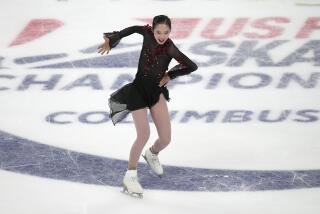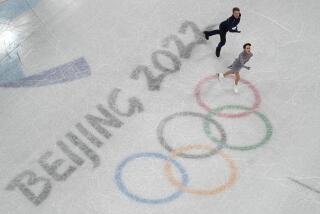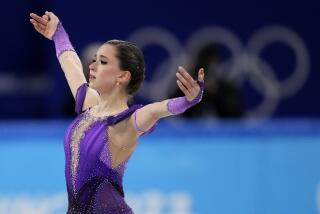Cohen Didn’t Act the Part, so of Course She Didn’t Get the Part
TURIN, Italy — She didn’t want to be there.
The dramatic thing about Sasha Cohen on Thursday night wasn’t the way she skated her spins and spirals, it was her shudder.
She didn’t want to be there.
Difficult to believe, devastating to watch, but as true as that wet patch on her leggings and those ice chips under her fingernails.
She didn’t want to be there.
Cohen was the leader before the long program at the Olympic women’s figure skating championships, yet she treated her potential triumph as if it were prolonged torture.
She was distracted and eccentric during group warmups. She was reluctant and reticent before her skate.
She took to the ice as uncomfortably as if it were melting. She bounced off her rear on her first jump, fell to her hands on her second jump, and that was that.
Four years, gone in 45 seconds, with an explanation as simple as six words:
She didn’t want to be there.
And she basically admitted it.
“I think I was not nervous, but apprehensive, knowing that I missed a lutz and flip in the warmup,” she said. “You know, when you go out there and have all the people watching and you know that your practice hasn’t gone completely right, it’s hard to feel like you’re getting churros at Disneyland.”
Hard for silver medalists, perhaps, but easy for champions.
When their team is trailing by a basket in the final seconds, champions want the ball. Just ask Michael Jordan.
When their team trails by two runs in the bottom of the ninth, champions want the bat. Just ask Derek Jeter.
When the going gets tough, for champions, that is Disneyland.
The legacy of Sasha Cohen is that she sees it differently, and thus America will see her differently.
Once thought to be Tim Duncan, she is instead Chris Webber.
Once destined to be Joe Montana, she is instead Peyton Manning.
Looks great in everything but sweat.
She’s only 21, and already she has blown first-place leads after the short programs in four major championships.
Many places in America, including this space, were buzzing after Tuesday’s short program triumph about her recent maturation and newfound resiliency.
Two days later, the cry from the Palavela was a familiar SOS.
Same Old Sasha.
Sasha Silver.
“No, I didn’t cry,” she said late Thursday. “I don’t usually cry unless I’m very angry.”
And this didn’t make you angry?
If you’d stayed on your feet for four minutes, you would have won an Olympic gold medal, yet you’re not angry?
The weirdness actually started Wednesday, when Cohen was the only skater among the final six to not show up for practice.
Her coach, John Nicks, wanted her to work out and stay sharp. She told him no.
“I was just very, very tired from the short [program] and ultimately, I’m not going to learn anything new,” she explained.
Maybe she really wanted to avoid the public scrutiny and heat that comes with being the Olympic halftime leader.
It sure seemed like it Thursday.
During the group warmup, she skated dizzily around the rink, as if being chased.
She fell on one practice jump, stumbled on another, nearly collided with Shizuka Arakawa, and skated away holding the bridge of her nose as if suffering from a migraine.
About six minutes later, summoned back before her program, she slowed to a halt. Standing by the boards, she grabbed Nicks’ hands and wouldn’t let go.
She took one breath, then another, then stopped herself and took one more before taking center ice.
It was painful to watch.
It only got worse.
Within the first minute of her performance, she was receiving the sort of pity cheers usually reserved for some 16-year-old rookie from Estonia.
By the third minute, the crowd quieted, its energy drained, the realization apparent that she had blown another lead and lengthened a legacy.
Of the idea that she is only a first-half skater, she said, “I would never let myself believe that . I’m a stronger athlete than that . I’ve done [good long programs] before, I’ll do them again.”
Ever accountable and unwilling to make excuses, also give her credit for blanching when asked about a possible leg injury.
“It’s been a rough time for me,” she said. “I’ve been dealing with lots of little things, nagging things . I’ve done my best to push through them. Tonight, I had enough medication where I felt good.”
Some will say that it is unfair to criticize a silver medalist, but let’s be as honest as Cohen here.
She didn’t deserve the silver medal. She should have finished fourth.
After Japanese champion Arakawa, second place should have gone to Irina Slutskaya, the bronze medalist who skated a more dazzling program and stumbled only once.
Third place should have gone to Fumie Suguri of Japan, the fourth-place finisher who was the most athletic of them all.
And Cohen knows it.
“I think it was a gift,” she said.
And her coach agreed.
“She said she was lucky and I said, ‘You’re right,’ ” Nicks said.
Some will also say that it is unfair to criticize an athlete representing America in a competition with the ideals of the Olympics.
But Cohen isn’t just a rink skater from Orange County. She is a handsomely paid professional with endorsement deals and touring contracts and a pad in Corona del Mar.
This is not about picking on the flaws of a little girl. It’s about chronicling the finish of an elite professional.
If the Dodgers can get zinged, so can Sasha Cohen, and she deserved it Thursday night.
She didn’t want to be there.
She didn’t want to be there?
*
Bill Plaschke can be reached at bill.plaschke@latimes.com. To read previous columns by Plaschke, go to latimes.com/plaschke.
More to Read
Get our high school sports newsletter
Prep Rally is devoted to the SoCal high school sports experience, bringing you scores, stories and a behind-the-scenes look at what makes prep sports so popular.
You may occasionally receive promotional content from the Los Angeles Times.







